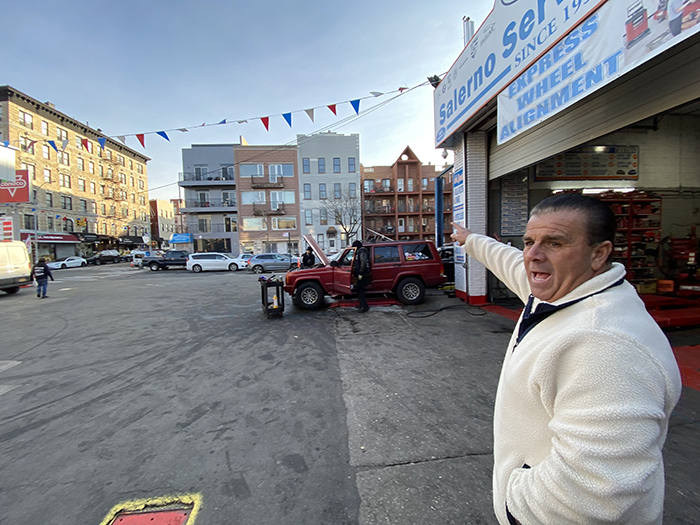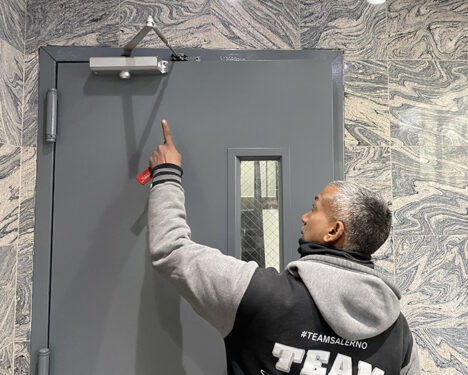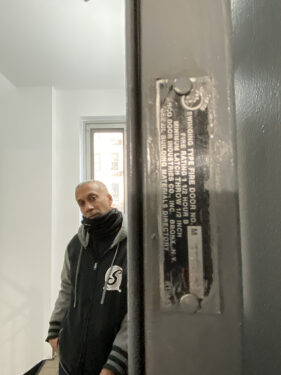
‘There’s nothing that you could do to get back a human life’
WILLIAMSBURG — Fireproof doors can be annoying to tenants.
They’re heavy and extremely loud when they swing shut. The concussion caused by these metal doors blasts through stairwells and hallways, prompting tenants to yell — or at least think to themselves — “Please don’t let that door slam!”
On the other hand, modern fireproof doors save lives. They’re so robust, they can keep flames and toxic smoke from spreading from an apartment fire.
New York City residents witnessed tragedy on Jan. 9 when the door to a split-level apartment remained open, which allowed a raging fire to belch toxic smoke throughout the 19-story building in the Bronx.
At least 17 people, including eight children, died in the building at 333 East 181st Street in Fordham Heights. All died of smoke inhalation, which also hospitalized dozens more.
Mario Salerno of Williamsburg, the operator of an auto body and service center on Lorimer Street, owns several nearby apartment buildings equipped with fire-safety features required by city code.
While fire investigators are still probing what kept the door from closing on its own, as is required by law, Salerno said preventative maintenance of safety features “is very easy, once you got it under control.”
“I mean, what’s so hard?” he added. “You push the door open, or you tell all your tenants Saturday morning, I’m knocking on everybody’s door; I wanna make sure the door swings.”
Salerno, a lifelong Catholic, is already known for how he cared for tenants during the early days of the COVID-19 pandemic lockdowns.
People couldn’t go to work, so he waived their rent, no strings attached.
Outside his shop on Jan. 14, Salerno motioned to a cluster of fire extinguishers, tagged and ready in case of fire in one of the service bays. But, Salerno said, fire extinguishers are for the “aftermath.” They are like security cameras — you have them, and burglars see them, but they might still rob your home or business. Likewise, flames can erupt, regardless of safety equipment.
The job of making sure Salerno’s buildings are up to code falls to Nigel Raghoonanan, a member of the shop crew who also has the responsibility of maintaining the rental properties.
“Some of these landlords don’t want to fix anything,” Raghoonanan said. “It costs money, but there’s nothing that you could do to get back a human life.”
On a tour for The Tablet, Raghoonanan pointed out numerous safety features, including mechanical “door closers” commonly seen at the top of door jambs — the ones that connect the door to the surrounding frame with two “arms” that pivot as the door opens but then pull it shut. In some cases, a pneumatic piston controls the pivoting arm.

Raghoonanan, however, was especially proud of the heavy-duty spring-loaded hinges, which they replace with age, on virtually all of their fireproof doors. Most doors have three of them; together they work to achieve a swift closure.
Companies are contracted to inspect safety equipment, such as sprinkler systems, under the supervision of city officials, Raghoonanan said.
Meanwhile, maintenance crews regularly check sprinkler systems, without turning them on, by reading the water pressure gauges, Raghoonanan said.
“They’re good to go,” Raghoonanan said. “Mario and I — we make sure we stay on top of it.”
James Bullock, co-owner and president of NY Fire Consultants and a retired FDNY deputy chief, said tenants should learn whether their building is fireproof or combustible because that determines if they should stay put or flee during a fire.

If a building is combustible and indeed on fire, occupants should evacuate immediately, according to Bullock. He noted that “if it’s fireproof, it’s best to stay in your apartment — that is if your apartment is not the one on fire.”
Salerno said his tenants receive that information when they sign their leases. Raghoonanan added that the buildings are fireproof and have double layers of sheetrock which help contain flames, for up to three hours: “By then, firefighters should have everything under control.”
The buildings are equipped with emergency lights in the stairwells that never go out because they have their own batteries in case electricity is cut. The modern smoke detectors are designed to be tamper-proof — if one chirps annoyingly, a tenant’s only recourse is to call maintenance.
Raghoonanan said the tenants are prompt to point out issues to be fixed, however small, which are acted upon because little things can grow into big problems.
“All of them are really good with us,” Raghoonanan said. “You got to make them feel good. Tenants will be happy when they see me fixing this or changing that.”
